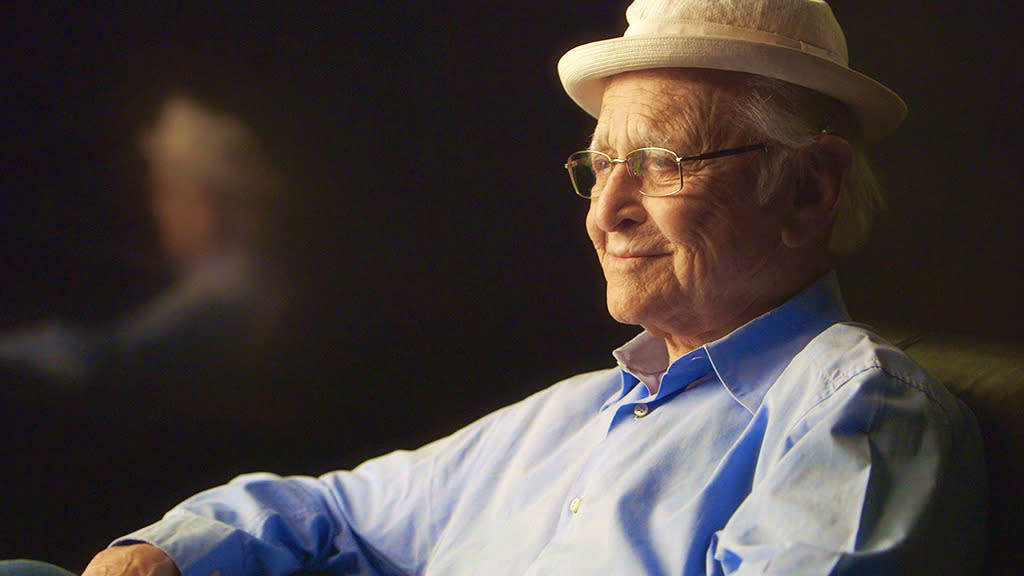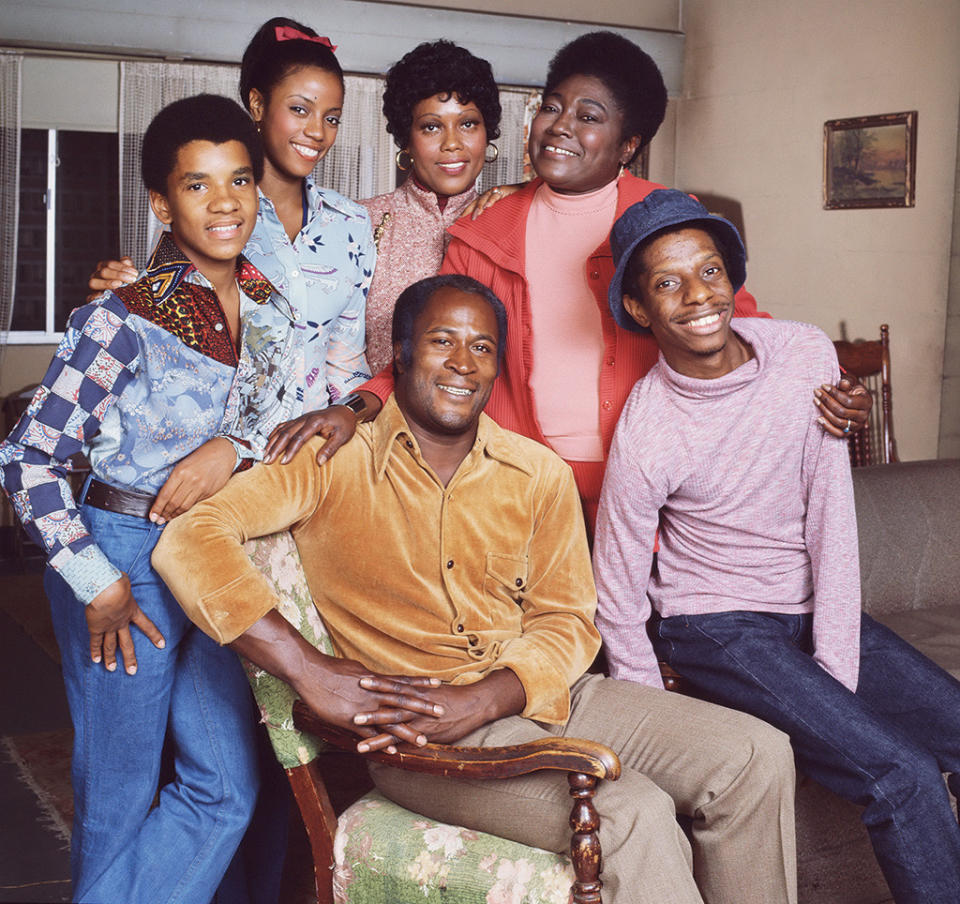Norman Lear Talks His Past, Present, and #PeakTV

Lear from the documentary ‘Norman Lear: Just Another Version of You’ (Photo: Everett Collection)
For better or for worse — but mainly for the better — few creators have shaped the contemporary television landscape more profoundly than Norman Lear. When All in the Family debuted on CBS in 1971, it ushered in a new era of socially conscious sitcoms that directly addressed big subjects in relatable ways. Subsequent Lear-produced shows like Maude, The Jeffersons, Good Times, and One Day at a Time were similarly of their time, while also seeming ahead of their time. To this day, Lear’s willingness to tackle controversial topics like racism, abortion, and divorce head-on lends those shows a bracing boldness that too many modern network comedies (and more than a few dramas) lack.
Now 93, the Connecticut-born writer revisits his life and career in the new documentary Norman Lear: Just Another Version of You, directed by the filmmaking team of Heidi Ewing and Rachel Grady. Opening in theaters this month and airing as part of PBS’s American Masters series on Oct. 25, the film features new interviews with former cast members like Rob Reiner, as well as archival clips and behind-the-scenes footage from Lear’s groundbreaking shows. Yahoo TV spoke with Lear about the tensions that were sometimes felt on the Good Times set, the TV shows he’s currently watching — or, thanks to #PeakTV, not watching — and whether All in the Family will ever be remade.
Yahoo TV: I’m too young to have seen All in the Family during its original run, but I do have vivid memories of watching your 1992 political sitcom, The Powers That Be, with my parents. To this day, I think of David Hyde Pierce as Theodore Van Horne rather than Niles Crane.
Norman Lear: I love hearing that! That was easily my favorite show that did not succeed. [Laughs] I think the network was afraid that we were too tough on Washington. But it was a great cast.
Throughout the documentary, we see you watching clips from shows like All in the Family and Good Times. What was it like to watch those scenes again? Did you ever find yourself thinking: “Wow … I made that!”
Well, there was really a whole team responsible for those series! There’s no one person who could have made all the shows I was once involved in. I’ve seen many of those clips through the years because I’m a big fan of those shows. The best part about making this documentary was working with Rachel and Heidi. I had absolute confidence in them because I loved their film Jesus Camp. They took my life and turned it into a very artful kind of biopic.

The cast of All in the Family. (Photo: Getty Images)
Several people remark in the film that All in the Family probably couldn’t be made in today’s television landscape. Do you think that’s the case? If the show were to come back, which actor would you want to play Archie Bunker?
I don’t know that it’s impossible. As a matter of fact, I’m thinking about some version of that. It’s not called All in the Family, and it’s certainly not with the Bunkers. There is only one Archie Bunker — there will never be another. But I am thinking of another [version of] that character for 2017, and I will tease you, without mentioning her name, that it would be played by an actress. So that’s something I’m thinking about now, and there’s been some interest.
What contemporary shows do you feel engage with social issues in the same way that your series once did?
I think that South Park never stopped! They do an amazing job. And Black-ish and The Carmichael Show are doing wonderful things, as is Seth MacFarlane. There are a lot of men and women out there who are taking on very political topics. The episode that Black-ish did about The Cosby Show was remarkable. This is the golden age.

The cast of Good Times. (Photo: Getty Images)
Some of the most revealing moments in the documentary come from behind-the-scenes footage filmed on the sets of Good Times and The Jeffersons, where you’re seen arguing with African-American cast members about certain story decisions.
It’s important to understand that there was an enormous amount of responsibility on the shoulders of those actors. They were the first members of their race to play the parents of children in a modern black family, and they had an overwhelming desire to be proper role models. So when the producers and writers came up with a story that had the potential for going in the wrong direction, they didn’t always agree. We were looking at it with less emotion and more from a story standpoint. So we had those discussions and arguments, and we got through every one of them! And when the episodes aired, not one state seceded from the Union. America handled it very well.
One flashpoint for controversy on Good Times was Jimmie Walker’s signature “Dyn-o-mite!” catchphrase, which some felt overshadowed the more serious topics the show addressed. Walker isn’t interviewed in the documentary, but have you discussed this with him since the series ended?
If America has one paramount product that we all have to live with, it’s excess. When we were making Good Times, we were doing a show where perhaps 13 episodes would have been effective and fine, but the network demanded 26 at that time. So actors would become comfortable with certain behavior receiving the approval and laughter of the audience and would tend to repeat the same way of doing it. And maybe it becomes a little bit sensitive in a culture that is totally sensitive. But Jimmie Walker is a great performer and a lovely human being. I had no problem [working with] him.
Rob Reiner is interviewed extensively in the film, and it’s clear that you share a very close bond. And we have you to thank for helping him make such beloved movies as Stand By Me and The Princess Bride.
Rob speaks of me as a second father, and I certainly feel that way. Our families had adjacent cottages on Fire Island when my eldest daughters were Rob’s age. They would have been 6 years old, and Rob was teaching them how to play jacks. I’ll never forget how he sounded like his father [Carl Reiner]’s Jewish comic friends at 6 years of age! Stand By Me is a wonderful film, as is The Princess Bride. I have nothing to do with those films creatively — I just helped him get them on the boards because nobody else wished to see them filmed.
You famously stepped away from making television for much of the ’80s and focused your energy on political and social causes, like the rise of the evangelical movement.
I was sufficiently aware in 1980 to know about the proliferation of evangelicals who were mixing politics and religion, and that offended everything I understood about who we were as a democracy. Before founding the organization People for the American Way, I did a TV spot that talked about how wrong it was for people to tell you if you were a good Christian or a bad Christian based on your political point of view. I took the ad to Father Hesburgh at Notre Dame, and he thought it was terrific and sent it on to other mainline church leaders. One of them said that one TV spot was so great, maybe I could do some more. So that’s sort of how things got started.
When shows like All in the Family and Maude were on the air, there were only three major networks, which allowed them to reach a wide audience. Today, there are many, many more ways of consuming television, which allows for a more diverse range of programming, but it can be a struggle to find viewers because of factors like time or subscription fees. Are audiences actually missing out because of the proliferation of choice?
Again, if ever there was a place Americans could study excess, it is in the amount of shows on the air! I’m not able to keep up with the amount of shows I hear are wonderful. So many times, I watch two episodes of a show and then something else catches my attention. There are so many people who tell me, “You aren’t watching The Night Manager?” Or Peaky Blinders. I got a call from someone I care about a great deal who said, “Norman, you gotta go back and watch Peaky Blinders. It’s the third season. You can watch it over a weekend. Do it!” It’s too much of a good thing.
Have you had a chance to see any of Louis C.K.’s Horace and Pete? That’s a show that feels very much influenced by your work.
My associate downloaded it for me. I can’t wait to see that show because I think Louis C.K. is a genius. [Ed. Note: Lear has since caught up with Horace and Pete and tweeted his approval.]
Speaking of Peaky Blinders, that series airs in America on Netflix, where you’re currently overseeing a remake of your sitcom One Day at a Time, starring Rita Moreno. What has your experience in the streaming realm been like so far?
I guess the biggest change is we’re making 13 episodes before anybody sees the first one! Usually, you’re on the air by the time you’re making the third or fourth episode. But we’re working on the fifth episode now, which is really good. I’m really enjoying it. I’m also hoping to do another show about older people. So far, Betty White has represented the entire demographic, and as much as I love her, she doesn’t make a whole demographic! Ask me the title.
OK, what’s the title?
Guess Who Died? [Laughs] That’s the question you read in your morning newspaper now. The show is set in a retirement village where life goes on: People are riding around on golf carts and falling in love. It’s a slice of life that’s very underrepresented in the media.
Norman Lear: Just Another Version of You opens in limited release on July 8 and will expand around the country in July and August before premiering on PBS on Oct. 25 at 9 p.m. All in the Family is currently streaming on Crackle.

